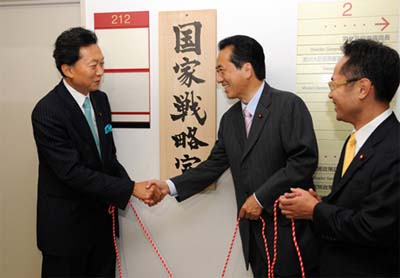In normal usage, ‘national strategy’ would refer to matters of foreign policy – particularly national defence. That is not what it means here however, as the NSO is currently charged mostly with matters referring to the budget, taxation, and economic management in general. Although, the Minister of Finance, Hirohisa Fujii, has stated that matters pertaining the budget will be ultimately decided by Ministry of Finance (not the NSO).
In fact, the NSO has been established to win domestic political battles, national security is not specifically mentioned as yet (although it is still early days). The NSO is first and foremost aimed to help the DPJ ‘defeat’ the bureaucracy, which they perceive as an illegitimate shadow government still too strongly attached to the LDP.
This is apparent in having the NSO being headed by Kan Naoto, a politician whose contempt for bureaucrats is (unfortunately) well known. Kan has forced bureaucracies to reveal embarrassing internal reports (in particular, as Welfare Minister in 1996 Kan revealed the extent of Aids contaminated blood for transfusions and slammed the ministry for sitting on its hands). The NSO’s anti-bureaucracy purpose is also apparent in Kan’s desire to, in the manner of Britian’s Policy Office, stock the NSO with politically appointed private persons (i.e. non-politicans/non-bureucrats).
However, Kan’s goals have been dealt a series of setbacks. The most important of which is the ‘rank’ of the NSO – which has not yet had the requisite laws passed to start formally inserting itself into policy. The NSO’s current status also means it has no mandate, no authority and (essentially) no staff. Worse still, the passing of these necessary laws is likely to be put back to when the Diet meets in regular session.
Indeed, Kan currently sits in limbo. This fact is compounded by the winding up of the Policy Research group within the DPJ (which Kan had headed). It is no longer apparent how Kan and the NSO will impact on policy.

